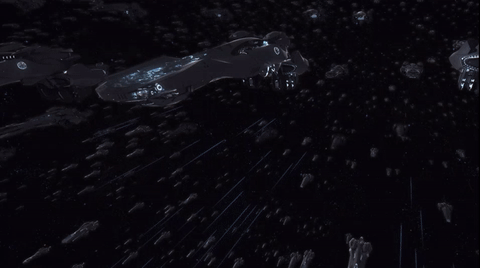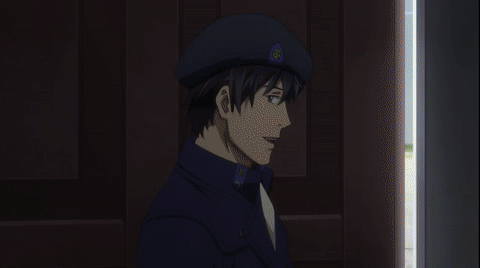This Week in Anime
What is Legend of the Galactic Heroes About Anyway?
by Nicholas Dupree & Michelle Liu,
Legend of the Galactic Heroes: Die Neue These is a daunting title for an intimidating political space opera. This week, Nick and Micchy explain the character motivations, themes, and surprisingly silly charm of this rebooted classic.
Disclaimer: The views and opinions expressed by the participants in this chatlog are not the views of Anime News Network. Spoiler Warning for discussion of the series ahead. Not Safe For Work warning for language.
 |
 |
 |
 |
Micchy
So Nick, question. On the scale of "Ian you prick move over" to "LINDA. WHAT THE FUCK.", how much do you dislike sitting on chairs properly?

So Nick, question. On the scale of "Ian you prick move over" to "LINDA. WHAT THE FUCK.", how much do you dislike sitting on chairs properly?

Nick D
I'd say I'm around a Sitting On The Desk Of The Enemy Base You Just Effortlessly Took Over

I'd say I'm around a Sitting On The Desk Of The Enemy Base You Just Effortlessly Took Over

How the fuck did Yang get up there anyway?
Yang is a cat in human form, that's how. He's smarter than every other person in the room, but he's too lazy to give a fuck, spends half of his life napping, and constantly sits on stuff he's not supposed to.
Ya got that right.


Paradoxically though, he also has zero chill.




So yes, it's finally time for us to talk about the delightful misadventures of Commodore Yang Wen-Li, also known as Legend of the Galactic Heroes: Die Neue These. Or as the narrator says it:
DIE NEUE THESE!
DIE NEUE THESE!
Oh, and I guess there's a pair of ketchup & mustard boyfriends there too.


Yep, we're taking a look at Production I.G's fancy pants reboot of the infamously eternal LoGH, and I'm actually pretty excited to get into it! I've always felt intimidated by the sheer length (and anecdotal dryness) of this particular title, so it's been interesting dipping my toes into the new remake.
As for me, I started watching OG LoGH a few weeks ago on a whim and subsequently fell deep into this particular hell. The original series may be intimidatingly long, but it's surprisingly compelling given its relatively dry premise of pseudo-European space politicking.
But never mind the original series, this is the shiny new adaptation of Yoshiki Tanaka's old '80s books and boy is it shiny.


Technology has finally given us the power to render the same CG model hundreds if not thousands of times and we're gonna use it dammit.
Gone are the days of specks for spaceships.


But yeah, DNT's production is decidedly polished in the way you'd expect from Production I.G It's not huge on animation set-pieces, but there's a lot of effort put into making it always look Nice, including the lengthy segments of faceless spaceships firing color-coded lasers at other equally faceless spaceships. At least that was my impression after the first couple episodes. Frankly, I was more hankering for a Ken Burns-style documentary series detailing this enormous galactic war instead of the more conventional structure, but DNT has turned out surprisingly compelling since then.
The first couple episodes of the new series bring out the pomp and extravagance in full force, for sure. I wouldn't be surprised if people tuned out despite the spiffy-ass spaceship battles; after all, not everyone is as much of a sucker for pew pew lasers as me. Luckily, the series has been smartly introducing material from later in the books to contextualize the characters' motivations. It's not great at balancing its focus across the entire cast, but seven episodes into DNT, it's pretty clear where these characters are coming from and what they're trying to do.
I'm a total newbie so I can't really comment on that, but I can assume that originally the backstory of this tiny bisexual ketchup packet wasn't in the 3rd episode?


Kircheis and Reinhard's childhood (henceforth referred to as Ketchup and Mustard) was covered pretty early in the original series, actually! The part of the cast that's really benefited from this adaptation is the Free Planets Alliance. Specifically, we're focusing much more on Yang's crew and what makes them tick.
Ah. I kinda thought the show had been adding more stuff with Reinhard and Car Keys to keep them relevant, since so much time had been spent with Yang, but I guess it's the other way around. Either way, I've appreciated LoGH taking its time to develop the human element of its setting. Its reputation and introduction had me expecting a more sterile history lesson with lasers, but I was pleasantly surprised when the bulk of DNT was spent establishing the motivations and daily lives of its cast.
On the Alliance side, fighting for freedom and democracy (supposedly), we've got Yang Wen-Li, the genius officer and hero of El Facil, who just wants a drink and a nap.


Yang's the philosophical lynchpin of this whole show. He never wanted to become a soldier in the first place, he joined military school because it was the only thing he could afford. For him, military service was only ever a tool to get access to education and historical materials. But the Alliance is full of warmongers who love to yell about their noble crusade. This boy ain't havin any of that garbage.
I was very relieved when he started calling bullshit.


Paradoxically, he's one of the best damn soldiers in the whole force, because life is fucking weird like that. He's a soldier because he has to be, and yet he's so darn good at it that even the Imperial commanders know his name.
Anti-war narratives that are also 100% about the spectacle of battle are nothing new (hi, Gundam) but LoGH is refreshing in that instead of grounding that message in abject human suffering, Yang is up front about war ultimately being a tool of the state, emphasizing constantly that the pageantry of warfare just exists to make it palatable.

And yet despite his pacifism, Yang's never aiming for the fantastic goal of permanent cure-all peace.




He's trying his darnedest to keep people from suffering unnecessarily, but at the end of the day there's only so much one generation can do before the systems they set up start to decay.
Yang's a pretty fantastic protagonist honestly. For one thing, he's an adult rather than the genre's typical plucky teenager. He's been around the block and has come to terms with his role as a soldier, taking steps to handle that power responsibly without being tortured by it. Which is a pretty drastic contrast to our deuteragonist(?) Reinhard, who is decidedly less considered in his perspective.
Mustard's grand plan is "What if I were to become a dictator, but like, Not Like That Other Guy?"


And to be fair, it's not terribly hard to make large-scale reform happen if you're the guy calling all the shots. The problem is that you're the guy calling all the shots with nobody to tell you when you're being a damn idiot.
And it's already pretty apparent that Reinhard is cool with calling a lot of shots. Directly into the bodies of his enemies. Like the series starts off with him stonecold obliterating 1.5 million enemy soldiers in order to climb the ranks for his plan to take the throne. That kind of determination is frankly unsettling.
And of course he has his supportive/codependent Good Friend there to back him up in this questionable quest.


That day, Reinhard was amazed to discover that when Kircheis was saying "the universe", what he meant was, "my heart".
Ketchup and Mustard are Married god dammit
This is definitely Love At First Sight if ever I've seen it.


But at the same time, the show has taken pains to show us that Reinhard is not a walking ball of ruthless fascism. Deep down, he's an angry kid who saw his family torn apart by people born into more power than him, and he wants to rectify that even if it means killing a whole lot of enemies (or possibly allies) to get it.
Like, he kind of has a point. The Empire's social structures are all but designed to keep those in power safe and comfortable.








I hesitate to call him wholly sympathetic, but LoGH is careful to show us that Reinhard is as much a product of the system he's trying to overthrow. He's acting on his desires in the way his entire culture has taught him to, by feeding the Empire War Machine.
He's another character taking advantage of the options available to him the best he can. In a world where it's either "murder your political rivals" or "get murdered by your political rivals," it's not hard to identify the preferable course of action, and that's a flaw in how their society has evolved. The Galactic Empire (formerly the Galactic Federation) might have begun democratically, with Kaiser Rudolf von Goldenbaum elected into power, but it's all too easy for those in power to lose sight of their founding principles. And changing those structures for the better is really dang hard.
It's also interesting to me how matter-of-fact LoGH is about all this. Like one of the most quietly uncomfortable moments in the show is this totally relaxed conversation about a law the Alliance set up to essentially conscript war orphans as future soldiers.








Yang, of course, has his own objections to the whole idea.








It's a terrifying concept born from balatant war mongering but it's just a fact of life in a society that's been at constant war for over a century. It's presented with all the dramatic flair of a history lecture, but that honestly makes it even more unsettling. And that's kind of LoGH in a nutshell. It's a story set in a world that's already been consumed by war—but not by destruction. It's a fascinating portrait of two distinct but incrementally similar societies that are built around warfare as a tenet of everyday life. It clearly doesn't approve of that, but it also seems fascinated with picking apart how those systems function and perpetuate. It's really fuckin nerdy is what I'm saying.
And that's essentially what draws people to the story! The original books were written in the last decade or so of the Cold War, but do you think it's fair to say that the current political climate is a good time for this thing to be in the conversation again?
Well, if Die Neue These's opening monologue is anything to go by...








In any case, I'm glad this property has been revived for a modern audience, even if I have my misgivings about the Kuroko's Basketball-ass character designs and the decision to make its first two episodes nothing but pew-pew.
At least for every excised axe fight, there's an equally sick pen stabbing.




I certainly was skeptical going into it. But if folks are willing to be patient, I think they'll find a lot to sink their teeth into with LoGH. For all of its heavy topics, it still manages to ground itself with interesting characters with endearing perspectives.
And it's not afraid to be silly sometimes, like when the Patriotism Police show up on Yang's front lawn and his solution is to turn the sprinklers on them like unwanted Christmas Carolers.


Look, those sprinklers already nailed him once, so now he has to find a way to use them against annoying reactionaries.


Though I do have one slight nitpick for the show. Did they really have to name a military officer...this?



discuss this in the forum (12 posts) |